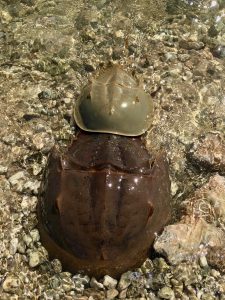Blog cover photo by Marvin Joseph, The Washington Post
Miami-Dade is the latest county to implement the Florida Horseshoe Crab Watch (FHCW), or “Linked With Limulus” citizen science program. Created in 2015 by UF/IFAS Nature Coast Biological Station, Florida Sea Grant, and the Florida Fish and Wildlife Conservation Commission, FHCW aims to gather information about Florida’s horseshoe crab populations. It’s thought that five specific sub-populations exist around the state. UF/IFAS Extension and Florida Sea Grant need your help to expand these monitoring efforts into Miami-Dade.

Since the approximately 1,350 miles of Florida’s coastline is a lot of ground to cover, the integration of citizen scientists is critical to being able to survey such a large area. Multiple counties run FCHW and as such, have been gathering data on their sub-populations over the past few years. The data collected can help to facilitate future management and policy decisions about the species and their habitats.
FCHW uses a scientifically sound methodology that was based off of surveys done in Delaware Bay. Volunteers are tasked with the following:
- Perform beach nesting surveys at the peak predicted daytime high tides during spawning months
- Reporting tagged crabs seen during beach nesting surveys
- Tagging and releasing crabs to gather mark-recapture data
Horseshoe crabs spawn throughout the year, but the peak spawning months differ slightly between northern and southern Florida. Spawning offers the greatest opportunity to observe the crabs, as they come ashore to lay their eggs in the sand. The only data that exists in Miami-Dade County are citizen observer reports, so we’ll begin surveying at the locations that have the most sightings. In 2022, we’ll survey in March and April, and likely start again in the fall months.
The volunteers will capture data on crab sightings by location. They will also collect crabs to measure and weigh, as well as place a tracking tag on their shell. High tide times vary by location, so having a large, reliable volunteer base is critical. If you are 16 or older, you can participate in training events and as a volunteer!
The first training event takes place this Saturday, February 12 from 9:00am-12:00pm at Crandon Park on Key Biscayne. Registration is only $5. To register for the training, please go here: https://bit.ly/3rJrHQv . For more information, please contact me at azangroniz@ufl.edu.
 2
2
